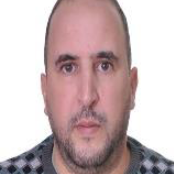
Hicham Diouane
Work place: Faculty of Letters and Human Sciences Martil, Abdelmalek Essaâdi University, Tetouan, Morocco
E-mail: h.diouane@uae.ac.ma
Website: https://orcid.org/0000-0002-8438-6953
Research Interests:
Biography
Hicham Diouane, Ph.D., is a Moroccan researcher and lecturer of English at Abdelmalek Essaâdi University, possesses a PhD in English Studies (2023), a Master's in Gender Studies, and bachelor‟s degrees in English Literature and General Philosophy from Fes University, Morocco. His academic pursuits reflect a multifaceted engagement with various fields, including education, religiosity, gender issues, and technology. Dr. Diouane has published articles addressing fundamentalism and social changes. In addition to his academic activities, he is interested in graphic design and creative writing.
Author Articles
Optimizing Heritage Design Education in Morocco Using English and AI
By Hicham Diouane Abdessamad Binaoui Mohammed Moubtassime
DOI: https://doi.org/10.5815/ijmecs.2025.04.04, Pub. Date: 8 Aug. 2025
The Specialized Institute of Applied Technology (ISTA) in Fes provides a vocational training course focused on heritage design to protect and promote the richness and diversity of Moroccan heritage. Currently, this course is taught in French. However, English-language resources, including CAD software, AI tools and online courses predominantly influence the design and new technologies fields. This study investigates the attitudes and preferences of ISTA trainees regarding the language of instruction for heritage design training, how they perceive integrating AI tools into their work, and the relationship between AI and language preference in this field. The study employed a mixed-methods approach, combining quantitative data from surveys with qualitative insights from in-depth interviews. The institution's trainees revealed that approximately 50% do not perceive the current language of instruction (French) as a significant barrier. Nonetheless, 70% expressed a preference for English-language instruction. The Chi-Square as well as Fisher's Exact tests revealed no significant association between language preference and the use of artificial intelligence in heritage-related work in the context of the current sample. Interestingly, the actual use of AI software among participants is low suggesting that while the theoretical value of AI is acknowledged, practical adoption is limited, possibly due to barriers such as lack of access to AI tools or insufficient training.
[...] Read more.Other Articles
Subscribe to receive issue release notifications and newsletters from MECS Press journals